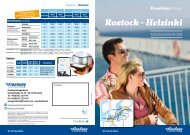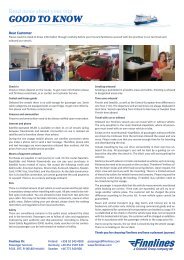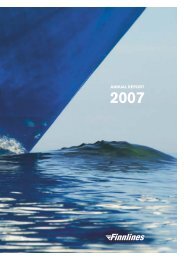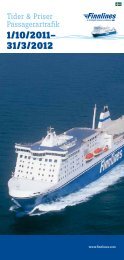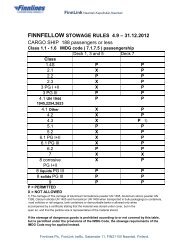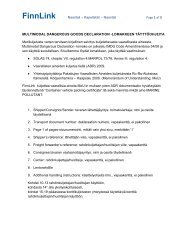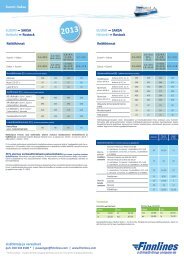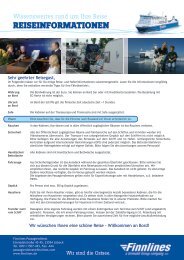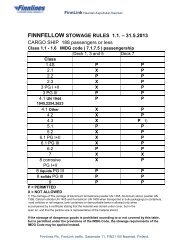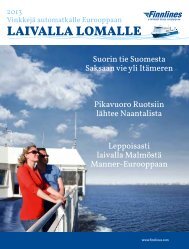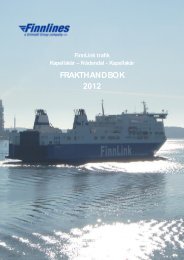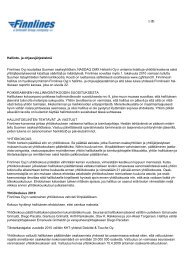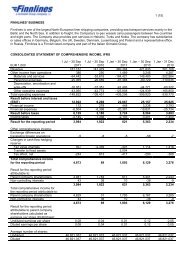You also want an ePaper? Increase the reach of your titles
YUMPU automatically turns print PDFs into web optimized ePapers that Google loves.
groups the carrier applies separate group terms which the<br />
carrier submits on request.<br />
10. PETS<br />
Transport arrangements regarding pets shall be agreed upon<br />
reservation. Each vessel has a limited number of cabins for<br />
passengers travelling with pets. No more than two pets per<br />
cabin are allowed. A person travelling with a pet must reserve<br />
a whole cabin. Pets may not be taken into bars, restaurants<br />
or saunas on board the vessel and the presence of pets in<br />
other public areas must be kept to a minimum. The passenger<br />
travelling with a pet is liable for any damage caused by the<br />
pet. The passenger must have with him/her the documents<br />
required by the authorities. If the authorities refuse entry to<br />
a pet on board on the grounds of inadequate documentation,<br />
liability for the costs thus incurred resides with the passenger.<br />
Regarding carrier´s liability for pets, see clauses 15, 16 and 19.<br />
Horse and husky transport fares will be calculated according<br />
to additional meter surcharge and are to be booked via<br />
call centre only.<br />
11. TRAVEL DOCUMENTS: PASSPORT, VISA AND OTHER<br />
TRAVEL PERMIT<br />
EU and Swiss citizens: The passenger must have a valid passport<br />
or identity card issued in an EU country or in Switzerland<br />
and which the state in question has approved as a travel document.<br />
A Finnish citizen can also present an ID card with photo,<br />
granted after 1.3.1999 (excluding a temporary ID card, an ID card<br />
issued to a minor without the consent of the parent/guardian<br />
and an ID card granted to a foreign citizen).<br />
Citizens of other countries: The passenger must have a valid<br />
passport and other necessary travel documents.<br />
Children: Children must have their own passport.<br />
Visa required when travelling to/from Russia.<br />
Responsibility for inadequate travel documents: Passengers<br />
themselves are responsible for ascertaining what travel documents<br />
are required. If an authority refuses entry ashore or<br />
on board to a passenger on the grounds of inadequate travel<br />
documents, the passenger is liable for any costs incurred to<br />
him/her (incl. the return journey) or to the carrier.<br />
The identity of all passengers will be checked at the check-in<br />
in the harbour.<br />
12. TICKET<br />
The booking confirmation which the passenger receives when<br />
making the reservation, acts as a travel ticket as soon as the<br />
travel has been paid in its entirety. The booking confirmation /<br />
the ticket, which evidences the contract of carriage incorporating<br />
the standard conditions, is a personal document which is<br />
valid for carriage of only the persons and vehicles specified<br />
and for receipt of the services indicated on it. A passenger<br />
may not transfer the rights indicated on the ticket to another<br />
person. Anyone who has obtained a ticket on behalf of another<br />
person shall be considered to have been empowered to do so<br />
as well as to accept these standard conditions of carriage on<br />
behalf of the other person.<br />
13. CHECK-IN<br />
A valid passport or an identity card and the booking confirmation<br />
which acts as a travel ticket as soon as the travel has<br />
been paid, must be displayed in the check-in. Against these<br />
documents, the passenger receives his or her boarding card<br />
or cabin key. The check-in is closed one (1) hour or one and<br />
half (1.5) hours before the vessel’s announced departure time.<br />
Passengers must observe the check-in times to ensure that<br />
their embarkation and the loading of their vehicle on board<br />
the vessel can be arranged appropriately without causing unnecessary<br />
delay to the departure of the vessel. If passengers<br />
arrive at the check-in after it has closed, neither they nor their<br />
vehicles can be guaranteed a place on the ship.<br />
14. GENERAL SAFETY REGULATIONS IN THE CHECK-IN AREA<br />
AT THE TERMINAL AND ON BOARD THE VESSEL<br />
RESTRICTIONS ON LUGGAGE ON THE VESSEL: Passengers may<br />
not bring to the terminal or on board the vessel any luggage<br />
(including vehicle) or hand baggage that can cause a hazard<br />
or inconvenience to the terminal, the vessel, people, other<br />
luggage, hand baggage or cargo. The carrier is entitled to carry<br />
ashore, render innocuous or destroy any such luggage and/or<br />
hand baggage at the passenger´s expense and without any<br />
liability on its own part.<br />
SECURITY CHECK: All passengers, vehicles, luggage and hand<br />
baggage going on board the vessel can be subjected to a security<br />
inspection in the departure area of the terminal or on board the<br />
vessel. A passenger who refuses to undergo a security inspection<br />
can be denied access to the vessel and the authorities will<br />
be notified of the matter.<br />
DISEMBARKING FROM THE VESSEL BEFORE <strong>DE</strong>PARTURE: A<br />
passenger who has boarded the vessel may not disembark<br />
from it before departure. If, nevertheless, the passenger does<br />
disembark, all luggage (including vehicle) and hand baggage<br />
must be removed from the vessel. A passenger who has disembarked<br />
from the vessel before its departure must compensate<br />
the carrier for the costs resulting from disembarkation and the<br />
removal of the vehicle.<br />
SAFETY ON BOARD: After they have boarded the vessel, passengers<br />
must familiarise themselves with the safety instructions<br />
displayed in the cabins. Passengers are obliged to comply with<br />
the regulations in force on board the vessel and to follow<br />
the disciplinary instructions and safety rules issued by crew<br />
members. Passengers must always have their boarding card or<br />
cabin key with them while they are on the vessel.<br />
REMOVAL OF A PASSENGER FROM A VESSEL: The carrier reserves<br />
the right to refuse to carry a passenger or to remove from<br />
the vessel a passenger who may pose a danger to the safety of<br />
other passengers, the crew or the vessel. A passenger who has<br />
been removed from the vessel is liable to compensate the carrier<br />
for the cost of removing him or her and his or her vehicle.<br />
SAFETY ON THE CAR <strong>DE</strong>CK: All goods in a vehicle must be<br />
well secured. It is forbidden to loiter on the car deck during<br />
the voyage. Smoking and naked flames are forbidden on the<br />
car deck. The valves of gas cylinders connected to campers/<br />
caravans must be kept closed throughout the time on board<br />
the vessel. Due to safety reasons, there is a recording video<br />
surveillance on the vessels. The video surveillance is carried<br />
out in accordance with legislation and is indicated by signs in<br />
the controlled areas.<br />
15. LIABILITY OF CARRIER<br />
The liability of the carrier; any amount to be compensated<br />
for the death of or personal injury to a passenger, loss of or<br />
damage to luggage and passenger´s deductible (sum to be<br />
deducted from loss or damage) is always limited in accordance<br />
with the provisions of the applicable law referred to in clause<br />
19, or of the 1974 Athens Convention Relating to the Carriage of<br />
Passengers and their Luggage by Sea, as amended by protocol<br />
dated 29.3.1990 (‘Athens Convention’). The carrier is not liable<br />
for any damage or loss or for costs arising from delay which<br />
are caused before the beginning or after the termination of<br />
the carriage by sea of passengers and their luggage as defined<br />
in clause 2 above. The carrier is not liable for the loss of or<br />
injury to live animals resulting from any special risks inherent<br />
in that kind of carriage. Notwithstanding anything contained<br />
in these standard conditions the carrier’s aggregate liability<br />
resulting from any distinct occasion is always globally limited<br />
in accordance with the provisions of limitation of liability on<br />
maritime claims under the Finnish Maritime Act or of international<br />
conventions as found applicable by the competent court<br />
referred to under clause 20 below.<br />
Possible claims must be presented in written form to the carrier<br />
at the latest one month after the end of the journey.<br />
16. LIABILITY OF THE CARRIER´S EMPLOYEES, AGENTS AND<br />
IN<strong>DE</strong>PEN<strong>DE</strong>NT CONTRACTUAL PARTNERS<br />
If an action is brought directly against the owner of the vessel,<br />
charterer, manager, its master, crew or any other person in the<br />
employ of the carrier, a carrier agent or independent contractor<br />
or against anyone having an interest in the vessel, such a person<br />
shall be entitled to avail himself of defences and limits of liability<br />
which the carrier is entitled to invoke under the contract<br />
of carriage and the relevant act specified in clause 19 below<br />
or the Athens Convention, as if they had been expressly made<br />
for his benefit. The carrier enters into the contract of carriage<br />
not only on its own behalf, but also as an agent and trustee<br />
for such persons who shall to this extent be or be deemed to<br />
be parties to the contract of carriage. The indemnities payable<br />
by the carrier and the other above-mentioned persons may in<br />
no event, even in aggregate, exceed the maximum amounts<br />
specified in the contract of carriage nor in the law specified in<br />
clause 19 below nor in the Athens Convention where applicable.<br />
17. RIGHT OF CANCELLATION OF A CONTRACT<br />
The rights of both the passenger and the carrier to cancel<br />
the contract of carriage are specified in the law applicable in<br />
accordance with clause 19.<br />
18. PERFORMANCE OF TRANSPORTATION<br />
The carrier is entitled to perform the transport by another vessel<br />
than the one announced or specified on the ticket.<br />
19. APPLICABLE LAW<br />
When <strong>Finnlines</strong> Pls is the carrier the contract of carriage is<br />
subject to Finnish law.When Rederi Ab Nordö-Link is the carrier<br />
the contract of carriage is subject to Swedish law. If the terms<br />
of these standard conditions are in conflict with the mandatory<br />
provisions of the Athens Convention or the mandatory provisions<br />
of national legislation that are applicable to any dispute<br />
concerning this contract of carriage, the mandatory provisions<br />
shall supersede the terms of standard conditions of this contract<br />
of carriage insofar as there is a conflict between these standard<br />
conditions and the provisions. Otherwise, the terms of these<br />
standard conditions of carriage shall apply.<br />
20. JURISDICTION<br />
Disputes arising under or in relation to the contract of carriage<br />
shall be determined at the option of the plaintiff by<br />
the competent court<br />
a) at the place of permanent residence or principal place of<br />
business of the defendant,<br />
b) at the place of departure or the place of destination of the<br />
vessel according to the contract of carriage.<br />
If the Athens Convention applies to the contract of carriage in<br />
accordance with clause 19 above, the dispute may, at the option<br />
of the plaintiff, be determined by the court specified in Article<br />
17, 1 (c) and (b) of the said Convention.<br />
www.finnlines.com<br />
23



